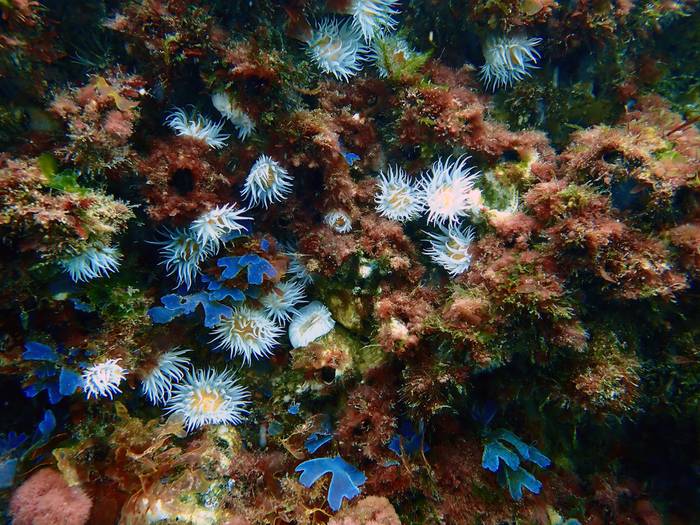The temperature of our planet is rising at great speed. 90% of the excess heat generated has been absorbed by the sea, resulting in a significant increase in the surface temperature of the oceans. In this context, immobile and temperature-sensitive organisms are particularly vulnerable.
In addition, sea warming is more visible in some places than in others. For example, on the Basque coast, sea temperature has risen 0.23 °C per decade, worldwide 0.15 °C. Given this situation, the Marine Marine Research Group of the UPV/EHU has analysed how the warming of the macroalgae communities of an area on the Biscayan coast has affected. Together with the Blanes Advanced Research Centre, he has researched the changes that have occurred over the past 40 years. “Studying the response of macroalgae communities to temperature increases is important for the conservation of marine biodiversity. Because they have a fundamental role in ecosystems,” says biologist Olatz Arriaga Telleria.

One of the main conclusions is that, as a result of the increase in temperature, Basque macroalgae communities have increased their species of warm affinity. On the contrary, those with cold affinity are becoming less and less. This has led to profound changes in the structure of communities, as the most depleted species, such as the Gelidium corneum, are structural. That is, they create three-dimensional environments that serve as a refuge for various organisms. They are habitats suitable for other algae, fish, invertebrates, etc., such as finding food and protecting them from predators. “As the structuring species decrease, no other species representing these important ecological functions has been detected, which means degradation of communities,” explains Arriaga. The warm-affinity species that have increased are smaller and morphologically simpler.
Resilience of macroalgae communities
Furthermore, research has shown that macroalgae communities respond rapidly to sea temperature changes. This has been deduced from data from the last decade. In fact, during the 40 years analyzed, the temperature has not increased homogeneously. Although the overall trend is upward, warmer temperatures were recorded in the last section (2014-2020). As Arriaga explained, “because of this we have been able to analyze the short-term response of macroalgae communities, and we have seen that the lost presence of structural species in these 6 years has somehow recovered to great depths. On the contrary, some species of warm affinity have decreased.”
Although the resilience of macroalgae raises some hope, researchers stress that controlling sea temperature does not seem to come immediately. And because temperature is the main cause of structural changes in macroalgal communities, they don't see an easy future. Therefore, they consider it essential to continue research and increase the frequency of monitoring: “This would help to better understand the behavior of macroalgal communities and to take proactive measures to protect the habitats of vulnerable species”. One of them may be the identification of areas with potential climate refuge. Work is under way to find solutions before the situation is irreversible.
Supplementary information
Olatz Arriaga Telleria (Getxo) is a biologist and is doing a PhD with a scholarship from the Basque Government in the Department of Plant Biology and Ecology of the Faculty of Science and Technology of the UPV/EHU. Itsas Bentos is a member of the Research Group studying the effects of climate change and pollution on macroalgal communities

